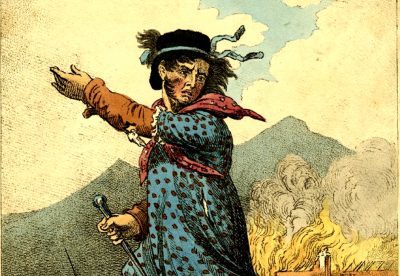The early nineteenth century brought drastic change to manufacturing. As the Industrial Revolution moved into full swing, factories and industries boomed and there was a sharp increase in jobs.1 Although many people in England were adapting to this industrial lifestyle, one group, known as the Luddites, showed resistance to the movement toward the mechanization of labor. The Luddites tried to resolve this by demolishing these modern machines, but ended up dispersing after government intervention.

Prior to the Industrial Revolution, the production of things was largely controlled by guilds. Guilds were organizations comprised of skilled artisans who dedicated their entire lives to craftsmanship. It took great learning, skills, and experience for guild members to manufacture their products. Because these people had to learn the entire process of crafting goods like textiles, it was a process that required years of training. The Shearers Guild, for example, which labored at the process of finishing pieces of woolen textiles, were among some of the most prestigious guilds in England in the late eighteenth and early nineteenth centuries.2

When the Industrial Revolution took off, there were startling contrasts between the work of guilds and the kind of work taking place in the factories. Unlike guilds, factory owners hired unskilled and inexperienced people, commonly children and women, and had them attending to hazardous machines for long periods of time. As opposed to a single guild member working on the entire process of textile making, often with years of experience in such production, a factory worker merely attended to the needs of his or her machine, changing empty bobbins of thread or making sure the machine had plenty of raw cotton for its work. The rhythm of work within the guilds tended to be flexible and free in comparison with factory work. Factory workers, on the other hand, faced overwhelming numbers of rules, and were constantly monitored.3
Among those affected by the rise of factories were the guild workers, who saw factory labor as unacceptable. Various guilds protested in various regions. Guild workers living in the Midlands counties such as Nottinghamshire, Derbyshire, and Leicestershire, worked in crafts of lace making and framework-knitting. Those residing in Yorkshire tended to be woolen guild workers. Finally, those who lived around Manchester were members of the cotton weavers guild. In 1811, these guilds started to take matters into their own hands against the production of factory-made products by unskilled workers. These protesters began in the Nottinghamshire village of Arnold. They were from the framework-knitters guild, and they broke into shops in order to take away jack wires that were essential to wide knitting frames. The following month, the frames themselves were destroyed by the protesters, now calling themselves Luddites. Several factors that led to the protests involved the restriction of looms that a weaver could own, as well as the creation of “cheap shoddy material” from the wide stocking frames. Other protester began calling themselves Luddites as well, such as the cloth dressers in Yorkshire called croppers. Traditionally, the croppers used a fifty-pound handheld shear to cut the nap from woven woolen cloth. With the introduction of the gig mill, the croppers felt outdated and “threatened.” The gig mill had the ability to shear woolen cloth easier with little to no experience required. And so, in 1812, the Luddites smashed the equipment in the town shops and mills of Yorkshire. It should be noted that Luddites also took part in food rioting and advocating for political reformation.4
It made the Luddites furious to see society abandoning their old traditions in favor of quick and dirty methods of production. Disguising themselves, they initially started to demolish the textile machinery, blaming that machinery as the sole reason for the radical change of their entire way of life. They often attacked in the middle of the night, making sure that they only harmed machines. Their attacks would be reminiscent of modern-day environmental activists who sabotage construction equipment. The Luddites claimed to have a leader named Ned Ludd, otherwise known as King Ludd. But who exactly was this king? He was a supposed leader who may or may not have ever existed. Historians have long debated whether King Ludd was a real person or some imaginary figure made up by the Luddites.5 Whether or not Ned Ludd existed, the Luddites saw him as a figurehead.

The Luddite attacks originated in Nottingham, England, but they steadily spread to other surrounding cities. As a result, the British government hired people to help protect the mill owner’s machinery. Things escalated in 1812 when a fight broke out between the Luddites and the guards, in which several Luddites were killed.6 Following the Luddites’ failed attempt to attack Rawfolds Mill, which resulted with the owner getting killed, the Luddite movement started to grow weak.7 Eventually, the government had to hang fourteen Luddites in 1813 to set an example to anyone else who might have considered rebelling. After that, any form of resistance from the Luddites stopped.8
As the Industrial Revolution grew exponentially, and factory labor prevailed, the way of life of the guilds gradually died out. With the introduction of mechanized production by machinery, cheap, unskilled labor came to dominate the production process in most industries. With state-of-the-art technology, who would want to go back to the slow, difficult process of production that the guilds had embraced? Ever since the British government’s intervention on behalf of the machine owners, the term Luddite has become a term of derision for those who would be ignorant obstructers of progress.
- Jerry Bentley, Traditions & Encounters A Brief Global History Volume 2 (New York: McGraw-Hill Education, 2016), 496-497. ↵
- Jerry Bentley, Traditions & Encounters A Brief Global History Volume 2 (New York: McGraw-Hill Education, 2016), 496-497. ↵
- Jerry Bentley, Traditions & Encounters A Brief Global History Volume 2 (New York: McGraw-Hill Education, 2016), 496-497. ↵
- International Encyclopedia of the Social Sciences, 2008, s.v. “Luddites,” edited by William A. Darity. ↵
- The Greenhaven Encyclopedia of Terrorism, 2007, s.v. “Luddites,” by Patricia D. Netzley. ↵
- The Greenhaven Encyclopedia of Terrorism, 2007, s.v. “Luddites,” by Patricia D. Netzley. ↵
- International Encyclopedia of the Social Sciences, 2008, s.v. “Luddites,” edited by William A. Darity. ↵
- Jerry Bentley, Traditions & Encounters A Brief Global History Volume 2 (New York: McGraw-Hill Education, 2016), 496-497. ↵



63 comments
Jose Maria Gallegos Cebreros
First of all, congrats on your article, it was very informative. I did not know anything about the Luddites and you made it very easy to understand. Your article is a bit short compared to the other ones I have read, but your writing style made it very clear to understand and got a lot of information out of it with a single read. Well done!
Alejandro Fernandez
In his work, the author provides a general understanding of the Luddites and their role in the Industrial Revolution. It was interesting to recognize how innovative technology can affect several groups of people, businesses, and cultures. Ultimately, this was a well-written article and I learned an immense amount from this specific time period.
Ana Diaz
This was a great article highlighting how the industrial revolution was perceived by some workers. The industrial revolution was essential to creating the modern way we live, without it we all probably would not be able to afford the luxury of having free time, although working a 9 to 5 can still be draining. However I think the social injustice aspects of the industrial revolution are often glossed over, and I think it’s great to bring light to the Luddites, who I would equate to unionized workers.
Peter Alva
This was an interesting article because I was curious about how certain workers responded to the industrial revolution. I do think that certain things when down in quality after the industrial revolution. I felt like one thing this missed out on but said indirectly was that there were jobs that were taken from some of the working-class people. I see how this created jobs but it created jobs for women and children and took away jobs from certain men.
Alanna Hernandez
The Luddite’s movement is so crazy yet so understandable. The struggle of working so hard and training to the point of profession just to be replaced by a machine is still very much felt today. It’s so cool to watch history repeat itself in a way. The industrial revolution proves that these are sort of “necessary evils” to make advancements for the bettering of all (capitalism).
Melyna Martinez
I believe that the industrial revolution brought to the surface the multiple conditions and experiences people underwent during this time taht were absolutely horrible anywhere from children to women alike. Luddite’s story is so interesting as he represents what many workers must have felt, having to learn and perfect skills for labor only to move out by a machine. Their anger was valid as they gave hours of work under horrible conditions for little pay.
Noelia Torres Guillen
I learned a lot of new information about the Industrial Revolution! I had no idea what or who Luddites were and never heard of them. I can understand the reasoning for protesting and hating these new machines and factories. They wanted to keep their traditional way of living, but there is always bound to be change, good or bad. I really liked the way you compared the Luddites to environmental activist, helped me understand their goal even more.
Christopher Morales
This is a real interesting topic and a piece of history I never thought about. Thank you for bringing it to my attention and telling it so easily. The Guild spent a lot of time learning their skill and I do not blame them for being mad about something that will take money away from them and jobs. While you described the perception of the Luddite as being people against progress. But what would you do in this situation? I would imagine the same as they did. We need to remember and recognize those hurt in the attempt for progress.
Marie Peterson
This is another great article about the effects of the Industrial Revolution. There are many great products of the Industrial Revolution, but at what cost? Women, children, and the working class were all forced to change what they had known so quickly. This definitely caused a lot of injustice and wrong for the product of better production. Great job!
Sydney Nieto
Great article, it was very Interesting and informative. The most interesting part that I have found was in the Luddite attack. The way people were killed, even the company owners, and how they hung the remainder and the rebels is crazy. It’s interesting the way they used to use women and children with no experience and it changed over time.